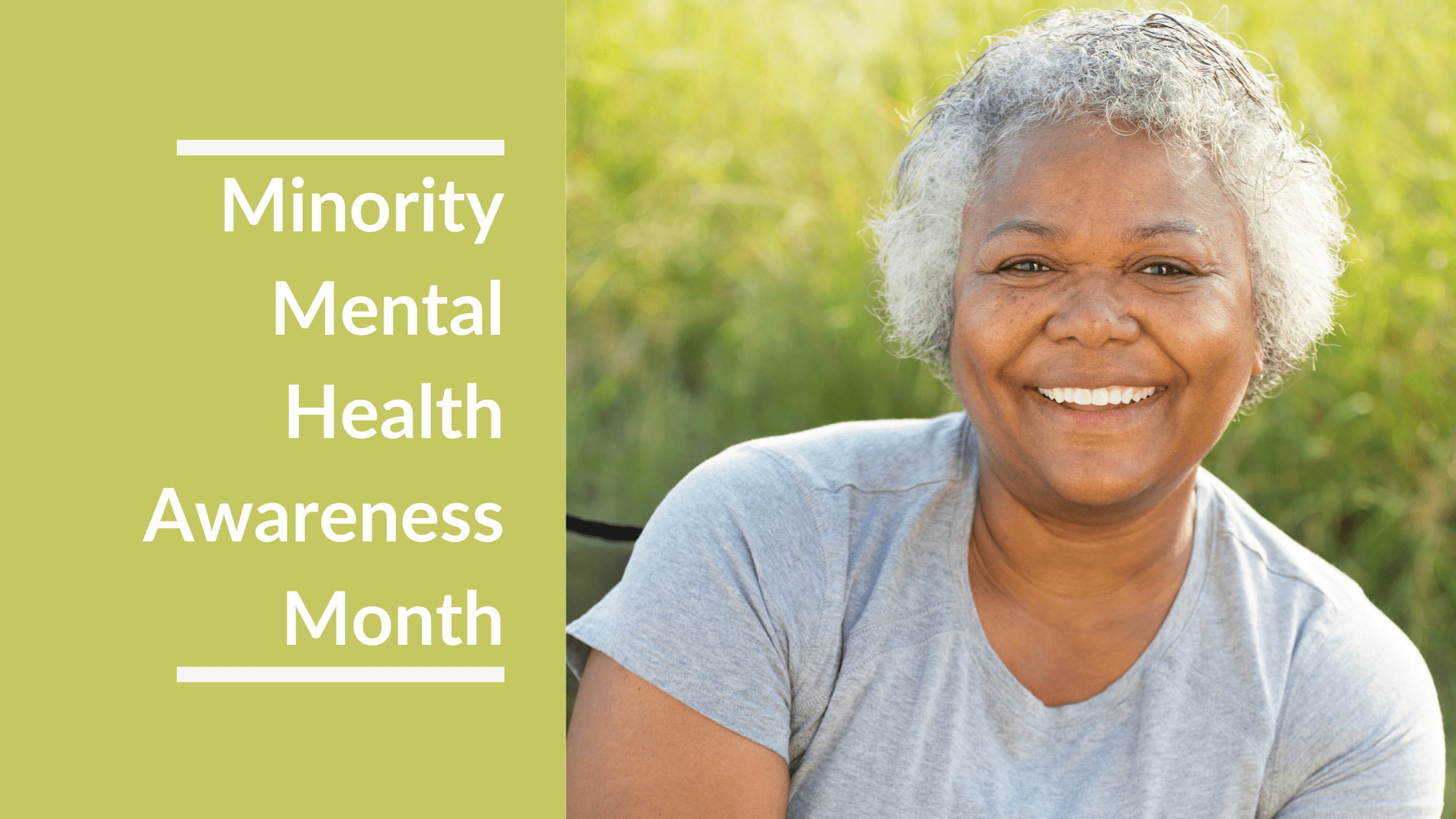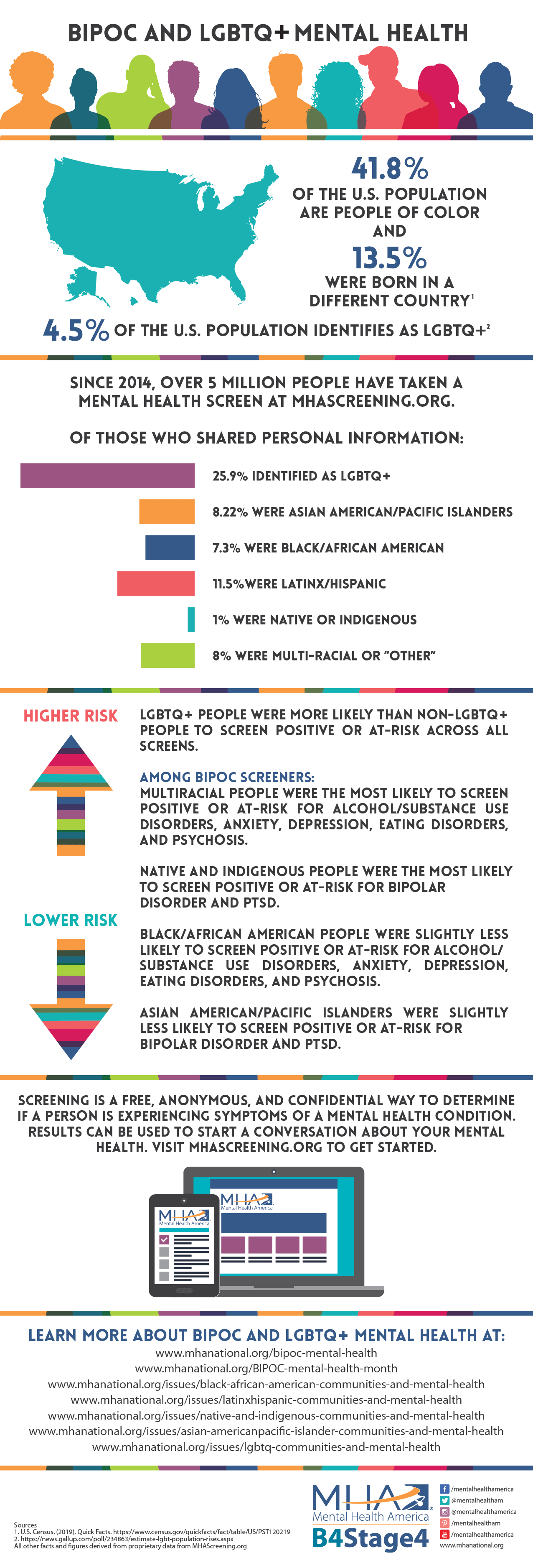
Bebe Moore Campbell National Minority Mental Health Awareness Month raises awareness of the unique mental health issues facing minority communities. Learn more about this observance and its importance to older adults.
July Is National Minority Mental Health Awareness Month
Bebe Moore Campbell National Minority Mental Health Awareness Month, or BIPOC Mental Health Month, aims to raise awareness of the unique mental health issues facing minority communities.
Each July, the US Department of Health and Human Services (HHS) Office of Minority Health (OHM) shares tools and resources to address mental health stigmas among minority groups. Additionally, OHM encourages local leaders to educate their communities about these harmful beliefs to help overcome these harmful assumptions.
This observance is particularly important in light of the COVID-19 pandemic, which worsened existing problems regarding access to mental health services.
Stigma is one of the main reasons why people with mental health problems don't seek treatment or take their medication. People of color, particularly African Americans, feel the stigma more keenly. In a race-conscious society, some don't want to be perceived as having yet another deficit.
BeBe More Campbell, 2005
Bebe Moore Campbell
Bebe Moore Campbell (1950 – 2006) was a prominent author, journalist, teacher, and mental health champion. After watching her daughter struggle to find help for her mental illness, Campbell founded the National Alliance on Mental Illness (NAMI) Urban Los Angeles chapter in 2000. NAMI promotes recovery by encouraging acceptance of and treatment for people of color with mental illness.
“Stigma is one of the main reasons why people with mental health problems don’t seek treatment or take their medication,” Campbell told NPR in 2005. “People of color, particularly African Americans, feel the stigma more keenly. In a race-conscious society, some don’t want to be perceived as having yet another deficit.”
The House of Representatives established July as Bebe Moore Campbell National Minority Mental Health Awareness Month in 2008 to honor her legacy. Since then, NAMI and other groups have led community events throughout the US. For example, the National Network to Eliminate Disparities in Behavioral Health (NNED) and NAMI promote joint webinars, resources, and similar opportunities.
Why Is National Minority Mental Health Awareness Month Important?
Mental illness affects millions of people in the US, regardless of race, ethnicity, gender, or identity. Likewise, people of any background can encounter the burdens of mental health problems. However, these factors can hinder people’s access to critical mental health services. BIPOC National Minority Mental Health Awareness Month aims to change this.
Addressing the problems of mental illness, poor health coverage, and stigma calls for everyone to take action. But unfortunately, inadequate access to quality care and cultural stigmas in most communities often worsen these challenges.
Research shows that mental health issues such as depression, anxiety, suicide, and PTSD are often higher among racial and sexual minorities. Sadly, society’s entrenched discrimination toward these groups usually leads to feelings of rejection, alienation, and oppression. Furthermore, immigration status, economic situations, education, and the availability of public health services are just some of the disparities that impact different ethnic groups.
In a Yale Medicine article, Dr. Carolyn M. Mazure, Director of Women’s Health Research at Yale, said, “There are good data and serious concerns that a range of social, racial and ethnic populations have understandable high rates of depression, and that even when there is access to care, depression is not recognized or treated. It is important that we recognize depression in all populations and seek to treat clinical depression even when someone may have a reason to be depressed.”

National Minority Mental Health Awareness Month 2022: Beyond The Numbers
This year, the theme of National Minority Mental Health Awareness Month is “Beyond the Numbers.” This month, Mental Health America (MHA) and other organizations will raise awareness about historical context, support systems, and steps to create a mentally healthy future.
On its website, MHA states:
Mental Health America recognizes that Black, Indigenous, and people of color have rich histories that go #BeyondTheNumbers. While there are stories of resilience born out of oppression, persecution, and abuse, there is immeasurable strength in each of these cultures. In an increasingly diversified America, we acknowledge the specificity of individual and group experiences and how it relates to their beliefs and wellbeing. BIPOC communities are significantly more likely to develop mental health conditions, and one of the major barriers to mental health treatment is access and the need for understanding mental health support. #BeyondTheNumbers explores the nuances and uniqueness in BIPOC communities.
Mental Health America
National Minority Mental Health Awareness Month Supports Seniors
Mental health is the foundation for health and wellbeing as a whole. For this reason, leaders at every level must treat mental health with the same importance as physical health for everyone, including older adults.
Fortunately, mental health — particularly that of seniors — is becoming a progressively vital aspect of discourse on public health. Data from the CDC shows that older men have the highest rate of suicide among any age group. Furthermore, according to a 2008 study by the American Association of Geriatric Psychiatry, 20% of adults 55 and older have a mental health condition, with the most common ones including:
- Anxiety
- Severe cognitive impairment
- Depression, bipolar disorder, or some of mood disorder

Depression Among Older Adults
Major depressive disorder is the most common mental health among seniors. Depending on the severity, this condition can significantly hinder a person’s physical, mental, and social abilities and impact treatments for other chronic illnesses. For example, according to HHS, older adults with depression have:
- Longer hospital stays
- Higher outpatient costs
- More prescription medications
- More trips to the doctor and ER
While it’s not uncommon for people’s risk of depressive disorders to increase with age, depression is not a normal part of aging. In reality, depression is treatable for 80% of cases. But unfortunately, older adults often don’t receive the help they need since depression in this age group often goes unrecognized, untreated, or undertreated.
For minorities, age-related disparities can be even worse. For example, a 2020 study of 25,500 adults over 50 found that Hispanic, Black, and Asian adults are up to twice as likely to report more severe depression than White older adults. Furthermore, when comparing symptoms among men and women, researchers noted that Hispanic women were more likely to “experience burden from core depressive symptoms and guilt.”
In contrast, Black women were “more than 80 percent less likely than non-Hispanic white women to report receiving treatment, even when reporting both clinically significant symptom levels and clinician-diagnosed depression.” The study’s authors wrote, “These disparities are striking given findings that older black adults appear as likely as older white adults to derive benefit from treatment when it is offered.” They suggested additional analysis to solve these disparities and direct prevention and treatment techniques to support health outcomes.
Organizations Providing Minority Mental Health Awareness Resources
MeetCaregivers Supports Health Equity For All
We believe that everyone has a right to age in place at home. But unfortunately, many seniors — especially minorities — lack the resources to do so safely, comfortably, and with dignity. Therefore, we aim to help more older adults overcome barriers hindering them from remaining in their own homes by providing affordable in-home care services and companionship. By doing so, we can help reduce loneliness and lower seniors’ risk of depression.
To learn more about our services, call 1 (888) 341-1136. Or, to get started today, visit our Find A Caregiver page and submit the questionnaire.
Are you a family caregiver who wants to learn more about your role? Are you interested in a career as a professional caregiver? Then, visit our Blog to find articles, guides, and resources made just for you.
Sources
- Centers for Disease Control and Prevention and National Association of Chronic Disease Directors. The State of Mental Health and Aging in America Issue Brief 1: What Do the Data Tell Us? Atlanta, GA: National Association of Chronic Disease Directors; 2008.
- Harrison, R. (2020, April 7). Health Notes: For Racial and Ethnic Minorities, Older Adults Report More Severe Depression. Medicine.Yale.edu. Retrieved June 16, 2022, from https://tinyurl.com/2p8as9ce
- Mental Health America, Inc. (n.d.). July Is Bebe Moore Campbell National Minority Mental Health Awareness Month. MHANational.org. Retrieved June 15, 2022, from https://tinyurl.com/ycxha7vt
- Mental Health Technology Transfer Center (MHTTC) Network. (n.d.). National Minority Mental Health Awareness Month. MHTTCNetwork.org. Retrieved June 15, 2022, from https://tinyurl.com/y46546hc
- NAMI. (n.d.). Bebe Moore Campbell National Minority Mental Health Awareness Month. NAMI.org. Retrieved June 15, 2022, from https://tinyurl.com/ytpm8ufh
- NPR. (2005, November 18). Stigma Can Prevent Much-Needed Mental Help. NPR.org. Retrieved June 16, 2022, from https://tinyurl.com/mtxykja3
- Substance Abuse and Mental Health Services Administration (SAMHSA). (n.d.). National Minority Mental Health Awareness Month. NNED.net. Retrieved June 15, 2022, from https://tinyurl.com/yckyk34m
- Touchstone Mental Health. (n.d.). July is Minority Mental Health Month. TouchstoneMH.org. Retrieved June 15, 2022, from https://tinyurl.com/4e2n97yp
- US Department of Health and Human Services. (n.d.). National Minority Mental Health Awareness Month. MinorityHealth.HHS.gov. Retrieved June 15, 2022, from https://tinyurl.com/nha8wkru
